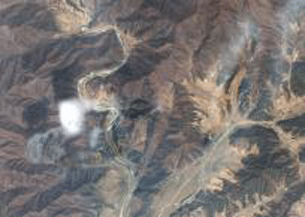North Korea: Political prison camps expand
| Publisher | Radio Free Asia |
| Publication Date | 4 May 2011 |
| Cite as | Radio Free Asia, North Korea: Political prison camps expand, 4 May 2011, available at: https://www.refworld.org/docid/4dd288f128.html [accessed 1 June 2023] |
| Disclaimer | This is not a UNHCR publication. UNHCR is not responsible for, nor does it necessarily endorse, its content. Any views expressed are solely those of the author or publisher and do not necessarily reflect those of UNHCR, the United Nations or its Member States. |
2011-05-04
Satellite images show North Korea's political prison camps have mushroomed under 'horrific' conditions .
 Satellite image shows new buildings at the Yodok prison camp in North Korea, according to Amnesty International. DigitalGlobe/Amnesty International
Satellite image shows new buildings at the Yodok prison camp in North Korea, according to Amnesty International. DigitalGlobe/Amnesty International
North Korea's political prison camps have expanded significantly, holding some 200,000 people under "inhumane" conditions with some inmates eating rats or picking corn kernels out of animal waste to survive, a probe by Amnesty International has showed.
The rights group published satellite images on Wednesday showing four of the six camps occupying huge areas of land and located in vast wilderness sites in South Pyongan, South Hamkyung, and North Hamkyung provinces, and producing products ranging from soy bean paste and sweets to coal and cement.
A comparison of the latest images with satellite imagery 10 years ago indicates a significant increase in the scale of the camps, Amnesty said in a report.
"North Korea can no longer deny the undeniable. For decades the authorities have refused to admit to the existence of mass political prison camps," said Sam Zarifi, Amnesty International Asia Pacific Director.
"These are places out of sight of the rest of the world, where almost the entire range of human rights protections that international law has tried to set up for last 60 years are ignored," he said.
Zarifi said that as North Korea appears to be moving towards a new leader in Kim Jong Un, the son of dictator Kim Jong Il, and to a period of political instability, "the big worry is that the prison camps appear to be growing in size."
Life in the camps
Amnesty spoke to former inmates from the political prison camp at Yodok in South Hamkyung province as well as to guards in other political prison camps to obtain information about life in the camps.
A significant proportion of those sent to the camps don't even know what crimes they're accused of.
At Yodok, prisoners are forced to work in conditions approaching slavery and are frequently subjected to torture and other cruel, inhumane, and degrading treatment, it said. All the detainees at Yodok have witnessed public executions.
Amnesty International believes the camps have been in operation since the 1950s, yet only three people are ever known to have escaped the so called "total control zones" and managed to leave North Korea.
About 30 are known to have been released from the "revolutionary zone" at the camp in Yodok and managed to leave North Korea.
According to the testimony of a former detainee, an estimated 40 per cent of inmates died from malnutrition between 1999 and 2001 in the Yodok camp.
The North Korean authorities are also known to use a cube "torture cell," where it is impossible to either stand or lie down, the report said. "Disruptive inmates" are thrown in for at least one week, but Amnesty said it was aware of one case of a child thrown into the cell for eight months.
Harsh winters
In most of the camps, no clothing is provided and prisoners face harsh winters. Inmates are also expected to work long hours undertaking strenuous and often pointless manual labour, the report said.
Food in the camps is scarce.
Amnesty has been told of "several accounts of people eating rats or picking corn kernels out of animal waste purely to survive, despite the risks-anyone caught risks solitary confinement or other torture."
"Hundreds of thousands of people exist with virtually no rights, treated essentially as slaves, in some of the worst circumstances we've documented in the last 50 years," said Zarifi.
"Conditions in these camps are inhuman and Kim Jong Il must close them immediately."
Reported by Parameswaran Ponnudurai.
Link to original story on RFA website
